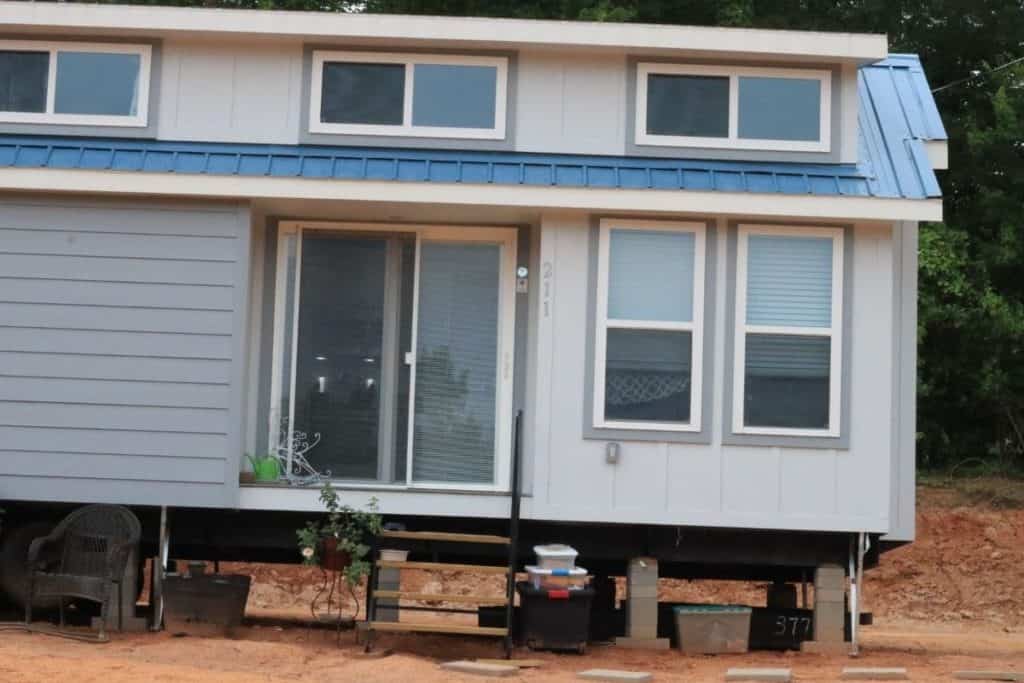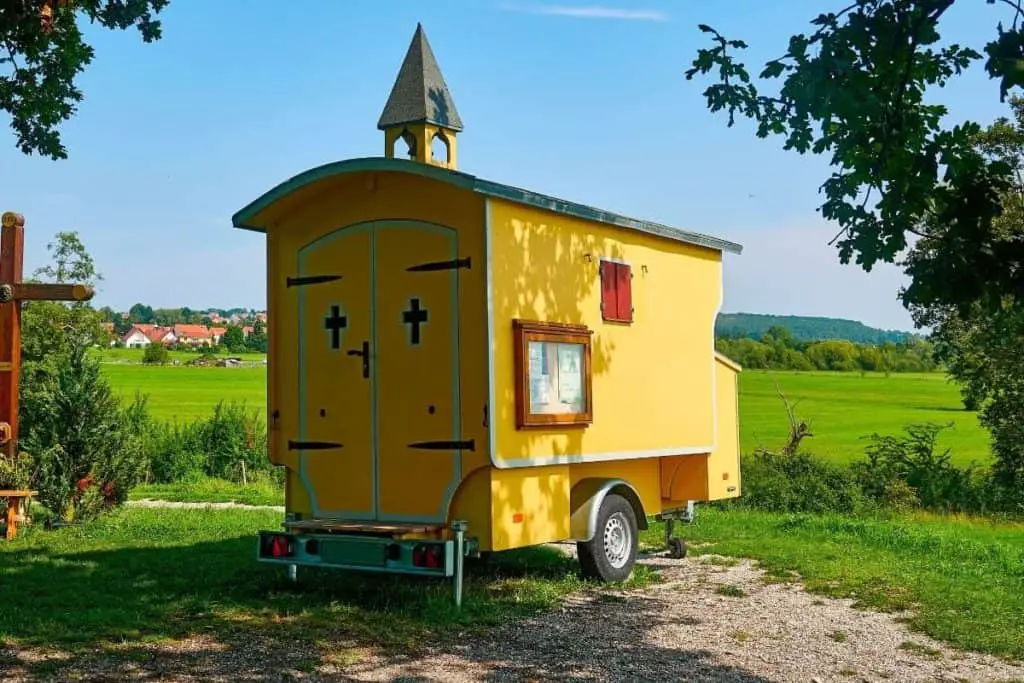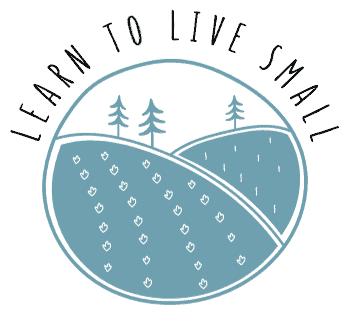The move towards owning a tiny house is not new, but it is certainly growing. It is made more attractive by the beautiful, adventurous lives of the people who currently live that way, as a quick search on YouTube or shows like Mighty Tiny Houses, Terrific Tiny Homes, Tiny House, Big Living, Tiny House Builders, Tiny House Hunters, and many more, would demonstrate.
An average, more traditional house would be over 1500 square feet to almost 3000 square feet depending on where you are located. With that in mind, know that a house measuring between a minimum size just under 100 square feet to 400 square feet is not just choosing to live smaller; it is an entire lifestyle change.
Tiny house living is not exactly conventional in the United States. No matter what is attracting you to look into this lifestyle, we’ll dive in so that you have a better idea about what you are getting into.
Types of Tiny Homes
Like so many other things on internet, there are some terms that get thrown around that can confuse this conversation if we don’t lay down a solid framework.
Tiny homes are less than 400 square feet in size.
Tiny homes on wheels are less than 400 square feet and you guessed it, on wheels.
Check out this article to get into the nuances of the different types of smaller living, but anything over 400 & not quite a traditional sized home is technically called a small home.
Read more:
Difference between tiny house and other small options
That said, this conversation can still apply to you; especially if you find yourself downsizing from one of those 3000 square feet larger homes.
Ultimately, would you want to buy or rent a small piece of land to establish your home in, or would you prefer the freedom and mobility of a tiny house with wheels?
You have to know this much before jumping in.
Why would you want to live in a tiny home?
If you are thinking about going reducing your footprint, you likely already have a list of reasons.
Read more: Benefits of tiny living
Your reasons will greatly influence how you see this conversation. Tiny living means different things to different people.
Some use a tiny house as part of a larger, off-grid effort where you will care about reducing consumption overall to reduce the energy you have to use. Hello, solar panels, batteries, and so much more!
You may be just as happy to connect to standard electric, water, and sewage services, so reducing how much energy you use has a different flavor.
So as you read through the pros and cons, I’ll try to give you some takes from those in the tiny house community, but you should keep what matters to you at the forefront. It’s a great lens to make decisions with!

Pros of Living in a Tiny House
With the increase of awareness about the environmental impact of human life and living, owning a tiny house certainly has its benefits over a larger house.
Tiny living comes with less of everything; less water waste, less electricity consumption and people are forced to find creative ways to dispose of waste.
More effort is made to reduce, reuse and recycle. Living a life like this generally makes you increasingly environmentally conscious and you find yourself trying your best to leave a smaller carbon footprint.
Desiring a minimalist lifestyle is another major reason people opt for tiny houses. Living smaller helps you learn to make do and make the best of the most basic necessities thereby decluttering your life. You get to simplify your life and keep it small.
The financial impact is another huge consideration. You don’t have to worry about a mortgage. That’s the big one – lower housing costs. Beyond the house payment savings, you also save money over a long period of time because you use less of everything. The minimal costs add up!
Many people who want to get away from the humdrum of everyday life of a bustling city, can decide to go off grid with a Tiny home. Because there is little energy consumption you can more easily sustain a self-sufficient life. You can source your energy yourself using renewable energy sources, source your own water yourself, manage your own waste and even produce your own food.
The possibilities continue. You could be looking for independence, you could be looking for a creative cure for homelessness, or it could be that you want to make everyday an adventure, and what better way than to live in this totally unconventional way.
Tiny homes on traditional home foundations give you much more flexibility with what you can build-in. You could build it like the everyday house fitted with all the regular utilities needed for everyday living like, bathroom, plumbing, waste disposal and electricity, the only difference of course would be the size.
You can live in a Tiny house with a foundation for longer.
You are better able to fit your house to guard it against disasters, burglary and any other risks.
You can build a basement foundation for more space.
You can do more with the area around you such as porches, steps, little relaxation area around your house, contraptions for your pets to play and move around in and little outdoor spaces you can relax in when you want to get some air and maximize outdoor living!
You have a better chance of getting it approved for residential use, as well.

Cons of Living in a Tiny House
Number of Occupants Considerations
It goes without saying that you would have to make do with less of everything in a tiny house.
The biggest issue is you have very little space to move around and live in. Having a guest or living with another person would take a lot more thought than living in a regular sized home.
You don’t have the luxury of having spares, like a spare bedroom, bathroom and other things needed for privacy. What about bathroom emergencies when you have only one bathroom?
Most people who opt for tiny living often live alone or with a partner. The more you add to the equation, the more creative you have to be to make that work compared to an average house.
Living with a pet in a tiny home adds complexity, but even more so would be starting a family. It is not usually advisable for a person or couple living in a tiny home. There are many things needed to raise a family especially when you’re dealing with a baby.
Babies and children require so much and you have limited space to work with!
Considerations for Your Stuff
While many people who choose tiny do so to declutter and simplify their lives, you have to be aware of the fact that you would have to find ways to live without many things you may have so far taken for granted.
There are many things you suddenly have to put a lot more thought to before you bring an impulse purchase home from the store.
Human and food waste disposal is a matter that would take more thought than you may have ever had to. Of course, there are innovations regarding disposal of human waste such as toilets fitted with incinerators or compost toilets that decompose the waste and cause it to evaporate. But imagine having to explain the whole process every time you have a new friend over.
Tiny homes are small so they are easier to clean but they also easily look untidy. It’s incredibly annoying!
You may have to watch a lot of YouTube videos for creative space saving techniques that help you store your things effectively while making your home neat and lovely. Basically, you need a lot of creativity when it comes to storage and effective use of your space.
Building Zone Considerations
The biggest issue yet are the zoning laws and building codes. There are still classifications such as tiny home friendly and not tiny home friendly cities. You definitely have to do your research regarding the city you would be settling down in or passing through in order to know the limitations or allowances of the law so as not to find yourself an inadvertent law breaker.
While zoning laws and building codes apply generally to residential homes, unlike Tiny houses on wheels, you may not be able to get away with building your house to your preferred taste and size because of prescribed specifications in the area you choose to live in. You need to find an area that permits you to build your Tiny home so you are not defaulting on any building code and regulations
Real Estate Considerations
If ever you decide you are done with your tiny home, selling can be difficult. There are lender financing concerns and desirability to a broad market. Tiny homes don’t scream ready for families!
Maybe you only intended a small break and now you’re ready to re-join conventional society. Or you simply discovered it isn’t for you. Selling it will prove much harder than you’ll find with a standard house.
Owning a Tiny house with a foundation is a long-term commitment to a particular spot. If you’re thinking of relocating, you can’t take your house with you, so this is really the only other option – to sell.
While the trend of owning a tiny house is gaining popularity, it is still a very small market of house buyers.
Also add in the challenge that you need land if you’re hoping to build a home of your own. While getting land for a tiny house is likely far less expensive than a regular home, it is still something to consider. Especially if saving money is why you’re looking into this further!
These considerations are not to discourage you of course, but so that you can weigh your decision better.
Pros of Living in a Tiny House on Wheels
If you are thinking of experimenting with minimalistic living, you may want to opt for a Tiny house with wheels. If you change your mind, if you can find space for it, you can convert it to a small office, play area for children if you have them or you can keep it for whenever you want to get away.
It is also a better choice if your reason for living this lifestyle is freedom. You want to be able to move from place to place and take your home with you. It comes with its own convenience and the familiarity of your own place. You don’t have to worry about the cost of accommodation, especially for extended stays in a particular area.
You may also in some areas with specifics about building codes that may trap owners of Tiny houses with foundation, fly under the radar and build your house to your taste.

Cons of Living in a Tiny House on Wheels
Your most immediate concern with a tiny home with wheels is where to park it. Here you have to do your research as well regarding whether you are allowed to park in a certain area, whether the city you are visiting has provision for parking of your mobile home and whether you have to rent.
Read this for ideas on where you can put your tiny home.
Then there is the how long you can stay in 1 place. Some places require a minimum requirement and some have a maximum.
Security is a major consideration in deciding where to park. With a mobile house, your security concerns go beyond losing your stuff, with your home on wheels, you may have to watch out for your whole house.
Another issue in this regard is whether your house is approved for sleeping in considering regulations for residential homes. In some places mobile houses are only allowable for temporary camping purposes.
If you own a mobile house, you most likely want to be able to take your house with you. This poses a limitation on the design of the house itself. To be able to move around, tiny homes on wheels tend to be really tiny. Read this if you want to know the legal dimensions of tiny homes and minimum size and maximum sizes in this space.
There are also design specifications required by law for towing your house in certain cities. Some cities even require special permits for you to be able to tow it. Size matters here, too.
Since you may intend to move around with your house, you have to ensure that your house is built to withstand the motion. You do not want to find, at the end of a long trip, looking to settle down and rest, and discover your home didn’t make the journey well.
Furniture, fittings, general design – everything requires special attention to hold up.
Finally, houses on wheels require you to be more self-sufficient. You have to mind your electrical and water resources, as well as, food and human waste disposal yourself.
You need to do extensive research to decide whether you are able to commit to this.
Wrap it up!
The foremost thing when considering owning a tiny home is your purpose. This helps in deciding which option you would go for. There are of course far more details to consider before making your decision.
Like many major decisions, extensive research is your friend. Think of this article only as a good start in the right direction. Read this to help see how many benefits there are overall about living small!
